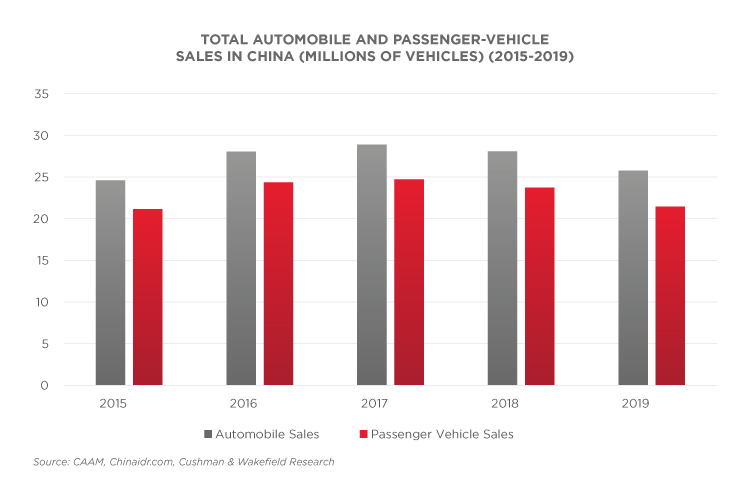
Driven by a growing economy and supported by government policy, the Chinese automotive industry has seen consistent growth over the last five years. With “energy saving and new energy vehicles” one of the eight target sectors for “Made in China 2025”, a significant portion of that growth has been created by companies headquartered within China itself.

Given the strength of the automotive sector, their impact on the real estate sector remains significant. For example, when considering the number of Grade A office leasing deals completed in China’s four first-tier cities between Q4 2018 and Q3 2019, companies in the manufacturing sector (which automotive companies form a part of) were responsible for 4.7% of deals done in Beijing, 12.0% of deals done in Shanghai, 11.4% of deals done in Shenzhen and 10.3% of deals done in Guangzhou.

During the COVID-19 outbreak, general manufacturing supply chains in China experienced enormous stress as production and distribution networks were interrupted with factories and transportation links across the region shut down on a huge scale.
The Impact of Innovation
The pandemic has already brought about a significant rethink in terms of where the automotive industry is heading and has further pushed the development of the industry towards environmental sustainability, innovation and new technology.
Technological innovation is transforming the automotive sector in China. New technology related to connectivity, zero emissions, autonomous driving, fuel cells, ridesharing, and the use of new materials is creating new business opportunities within the sector, and driving increased demand for space including for:
- Front offices
- Back offices
- R&D centres
- Data centres
- Sales centres
- Manufacturing plants
- Logistics facilities
We’re also seeing innovation in distribution, with forms of car dealership becoming much more diverse. Apart from traditional 4S stores (sales, spare parts, services and surveys), novel car dealership forms are becoming increasingly popular in China, such as cars sold in car-dedicated ‘supermarkets’ and experience centres.
Transforming Through Technology
Reflecting on the future tech trends, we also expect automotive sector property portfolios in China to be impacted in the following ways in the years to come:
- New or reconfigured existing R&D office space will need to be set up to continue to research and develop the new technology
- Expansion space close to R&D centres will be required to house developers and support future development
- Suppliers and third-party service companies will need to take out similar additional office space as they grow
- Front offices in visible quality downtown located offices or visible quality suburban located offices will be required in order to house business management, sales and marketing, finance and other related business groups
- Back offices in suburban locations will be required to house the various business admin groups
- Additional data centre space will be required as connected technologies in the sector start to come online
- New or reconfigured existing manufacturing plants will need to be established to manufacture batteries, fuel cells, parts made from the new materials and, ultimately, the new vehicles themselves
- New or reconfigured existing logistics space will need to be created to store new parts and components
- New or reconfigured existing dealership space will be needed to introduce the new vehicles
- Charging stations will need to be built (if the OEM is looking to shoulder the responsibility of building out and running the charging station infrastructure)


